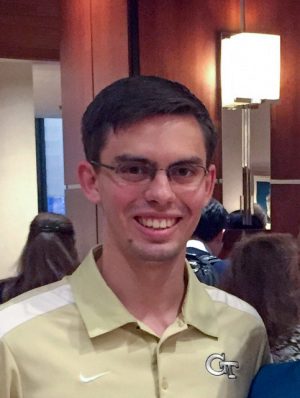 |
| Benjamin Leon |
Doctoral student Benjamin Leon has been chosen to receive the prestigious 2019 Robert L. Lichten Award for his paper, Ground and Flight Tests of a Cable-Driven Four-Bar Linkage Robotic Landing Gear for Rotorcraft.
The paper explores Leon's research into a robotic landing gear (RLG) innovation that could improve access for rotorcraft seeking to land in mountainous terrains. Funded by the Defense Advanced Research Projects Agency (DARPA), the research demonstrates the design, integration and testing of the RLG system installed in a commercial S-100 Camcopter. Leon is already scheduled to present the paper before the Advanced Vertical Flight Session of the Vertical Flight Society's Forum 75 in May.
"This paper introduces a force feedback controller, state estimation algorithms, and drivetrain components that permit the rotorcraft fuselage to remain level on rough terrain," said Leon, a native or Warner Robbins, GA.
"The system is then demonstrated using ground and flight experiments, and performance metrics are found to match design metrics.”
Leon worked closely with his advisor, Prof. Claudio V. Di Leo and Prof. Julian Rimoli, to fine-tune the paper, one of several that he has developed from the three-year research assignment.
 |
| Prof. Claudio Di Leo |
"Ben has been the graduate student in charge of the RLG program since we began the current stage of research," Di Leo said. "This award is really a recognition of the substantial intellectual contributions he has made to the program as well as his demonstrated leadership in bringing to live this complex and multidisciplinary project."
The Lichten Award was established in 1975 by the Vertical Flight Society (formerly the American Helicopter Society) to honor the late Robert L. Lichten, a former VFS president who is often referred to as “The Pioneer of Tilt Rotor Technology.”
"Working on this project strengthened my skills in terms of applied mechatronics for rotorcraft," said Leon, who hopes to defend his dissertation next fall.
"It's one thing for someone to design and simulate an RLG, another to get it to function the way you need it to function. We've been able to truly bring it to the next TRL (technology readiness level) with an application and a flight test in a relevant environment on a commercial rotorcraft."
The views, opinions, and/or findings expressed are those of the author(s) and should not be interpreted as representing the official views or policies of the Department of Defense or the U.S. Government